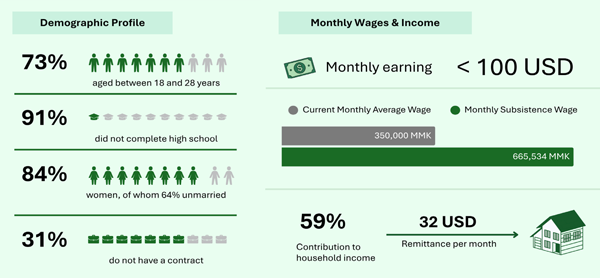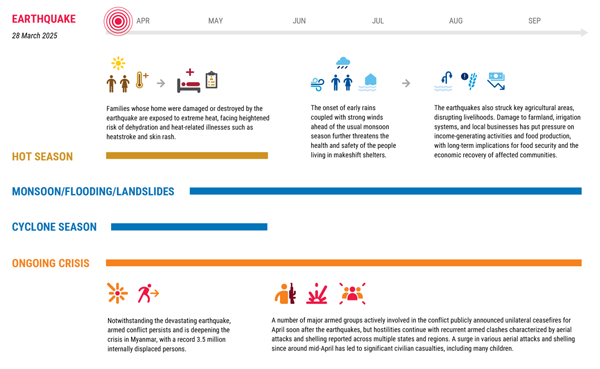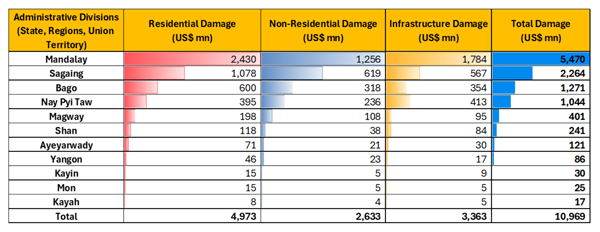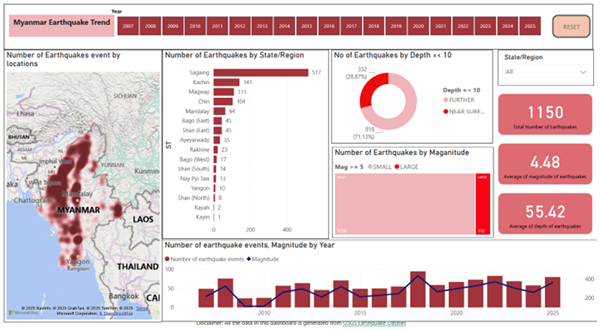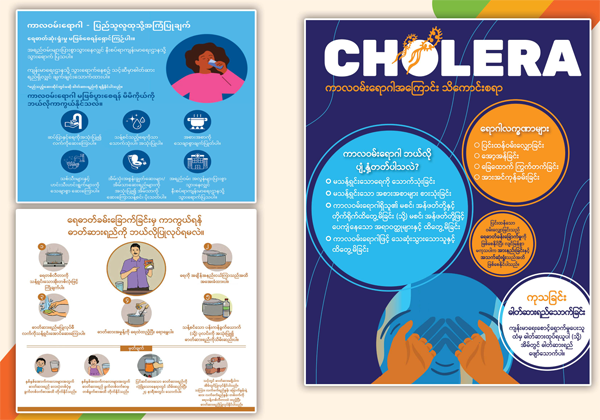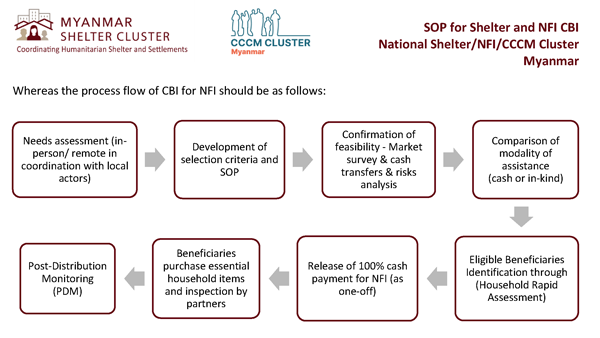This UNDP report, titled “Stitches of Struggle and Hope: The Realities of Garment and Apparel Workers in Myanmar”, builds on 2022 study Livelihoods Hanging by a Thread to provide an updated picture of Myanmar’s garment workers, four years after the military takeover. Based on 667 interviews in Yangon and Bago, it captures how living and working conditions have further declined for a predominantly young, female, and migrant workforce. Most workers still earn below subsistence levels—averaging less than USD 100 per month—and regularly work long hours under insecure and often unsafe conditions.
📝Read more in the report.
News
We are currently updating Assessment/Publication Dashboard and Data and Overview Report, which includes over 2,600 inputs from 199 agencies last year.
Please share your planned, ongoing, or completed assessments with us, following our Assessment and Publication Guidelines. This exercise serves as a resource to better coordinate information gathering initiatives, and to share plans, results, methodologies, data, and expertise.
For assistance, contact our focal person, Ko Zin Min Tun at [email protected] or call 09 7740 777 61 during office hours.
We are offering Excel Training by Distance Learning to MIMU partners who are implementing humanitarian and development activities in Rakhine State and Ayerwaddy Region.
Who can apply:
- Myanmar nationals from UN Agencies, INGOs, LNGOs, MNGOs, CBOs, and Red Cross.
- Staff needing Excel skills for information management, M&E, and programme tasks.
Course details:
- Duration: 5 weeks (one hour daily)
- Format: Self-paced with training materials available on the MIMU Training Resources page.
- Certification: Completion of 4 assignments and a final exam required.
Application steps:
- Please contact us via [email protected] by 11 June (Wednesday).
- Selected applicants will be notified by 17 June (Tuesday) and invited to a pre-test on 24 June at 10:00 am.
- Final selection results will be sent by 1 July, and the course will begin in the first week of July 2025.
Participation is limited to 15 people, selected based on their need and potential use of Excel skills.
People of Myanmar face escalating crisis amid earthquake devastation and protracted conflict.
The combined impacts of the recent earthquakes and ongoing challenges have deepened humanitarian needs across Myanmar, leaving millions in heightened vulnerability. A multisector initial rapid assessment conducted by the UN and its partners identified priority needs, including cash, food, construction materials and emergency shelter support across 44 earthquake-affected townships in Bago, Kayin, Mandalay, Nay Pyi Taw, Sagaing and Shan.
More than 75 per cent of the assessed localities have received assistance since the earthquakes, though continued support remains essential to address urgent needs.
📝Read more in the Myanmar Humanitarian Update No. 46 from UNOCHA.
The Global Rapid Post-Disaster Damage Estimation (GRADE) report summarizes the direct economic damage to buildings and infrastructure caused by the March 28, 2025, magnitude 7.7 earthquake in Myanmar. It provides critical insights to support response, recovery planning, and strategic discussions on risk reduction.
- Total direct economic damage is estimated at US$10.97 billion, equivalent to about 14 percent of Myanmar’s GDP for financial year (FY) 2024/25.
- Residential buildings suffered the highest damage, accounting for US$4.97 billion (45 percent of total damage).
- Affected households in the most impacted administrative divisions could experience consumption losses of up to 25 percent.
- Recovery and reconstruction costs are expected to significantly exceed direct damage estimates.
📝Read more in the report.
Earthquake response and data were key parts of the recently completed Power BI Training from MIMU. Here is an example of a great final project from training participants. Data analysis tools such as Power BI and Tableau play a key role in information management processes during disasters.
Please keep an eye on this newsletter for announcements about the next training.
Meanwhile, you may also learn Power BI through our online resources.
Information, Education, and Communication (IEC) materials for monsoon season, including posters on cholera and influenza, are now available on the MIMU website.
📝 Explore on MIMU’s Emergency Resources page.
The Myanmar Environmental Country Profile (ECP) offers practical guidance for Shelter/NFI/CCCM Cluster partners in Myanmar, focusing on integrating environmental sustainability into shelter and settlement interventions.
📝 Read more in the guidance note.
The Shelter/NFI/CCCM National Cluster has developed Standard Operating Procedures (SOPs) with the aim to support partners as a reference for the implementation of cash for Shelter and NFI (Non-food items) assistance. These SOPs outline the systems, responsibilities, and critical actions for implementing cash-based Interventions of cluster partners in Myanmar. These SOPs deal with the feasibility, set-up, implementation, and monitoring phases of the project cycle for cash disbursement for sectoral cash (Cash for Shelter and Cash for NFIs). The SOPs guide both cash transfers delivered by cluster partners and those by financial service providers on the basis of partners’ assessment. They do not cover any pre-implementation activities (e.g., assessment, response analysis, etc.).
📝 Read more in the document.
🌐 Explore the Shelter/NFI/CCCM Cluster web page on MIMU.
Seven weeks on, the impacts of the 28 March earthquakes in central Myanmar continue to drive significant humanitarian needs, both for immediate relief and early recovery.
See the breakdown of needs, responses and activities from the latest Situation Report #6 from UNOCHA.
- ‹ previous
- 2 of 13
- next ›

